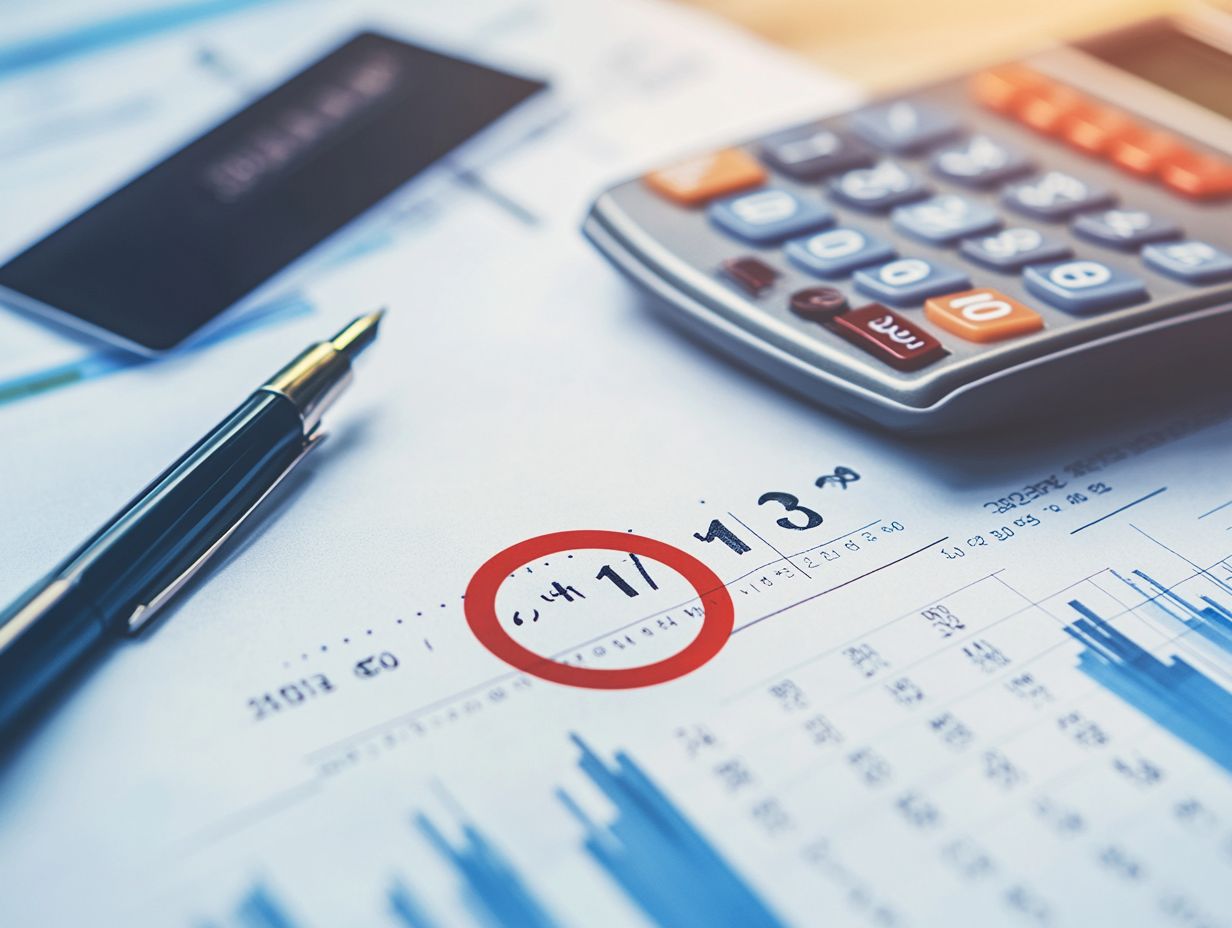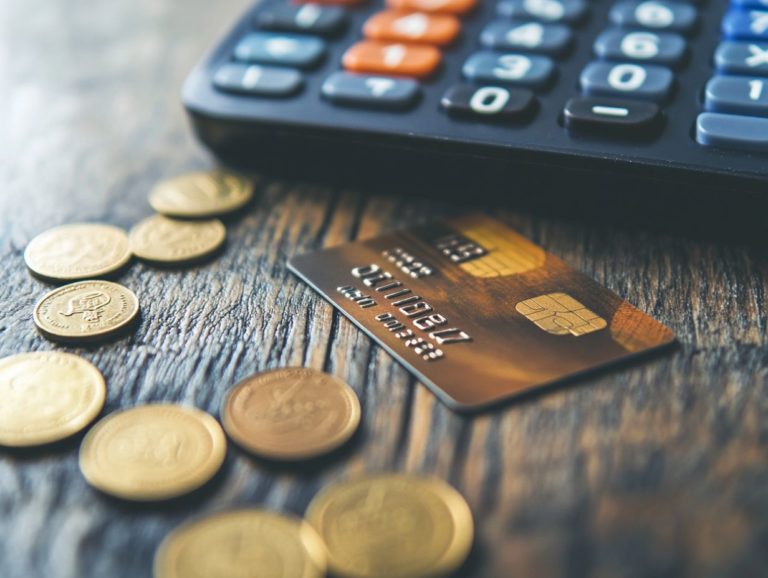Understanding Credit Card Payment Due Dates
Managing credit card payments can often seem daunting, particularly when it comes to those all-important due dates. These deadlines are important for your finances not just for steering clear of late fees, but also for safeguarding your credit score.
Let’s explore what payment due dates are and why they matter! This article explains how they are calculated and emphasizes the significance of meeting them. It outlines effective strategies for managing these dates and offers practical tips to help you stay on course.
Stay informed and regain command of your financial landscape!
Contents
- Key Takeaways:
- Overview of Credit Card Payment Due Dates
- How Credit Card Payment Due Dates Work
- Paying Your Credit Card Bill on Time: Why It Matters!
- Master Your Due Dates for Financial Success!
- Tips for Avoiding Late Payments
- Frequently Asked Questions
- What is a credit card payment due date?
- When is the credit card payment due date?
- Why is it important to understand credit card payment due dates?
- What happens if I miss the credit card payment due date?
- Can I change my credit card payment due date?
- What should I do if I am unable to make a payment by the credit card payment due date?
Key Takeaways:

- Credit card payment due dates determine when your payment is due and how much you need to pay.
- Due dates are typically calculated based on your billing cycle. Minimum payments are required to avoid late fees and potential damage to your credit score.
- Paying on time is crucial; late payments can result in fees, interest charges, and negative impacts on your credit history.
- To effectively manage due dates, set reminders and create a payment plan to ensure timely and consistent payments.
- To avoid late payments, practice good habits such as regularly checking your statements and setting up automatic payments when possible.
Overview of Credit Card Payment Due Dates
Understanding credit card payment due dates is essential for preserving your financial wellness, as these dates play an important role in your personal finance, including credit scores, interest charges, and the risk of late fees.
The billing cycle determines when your payment is due, with the statement closing date signaling the end of that cycle. Failing to meet these deadlines can result in a past-due status, which may tarnish your credit history.
What They Are and Why They Matter
Credit card payment due dates are vital milestones on your financial calendar, marking when your payment is due to avoid late fees and uphold a solid credit score.
Grasping these deadlines is essential for anyone aiming to manage credit card debt effectively. Timely payments are more than just a checkbox on your to-do list; they significantly influence your credit score, showcasing your reliability and financial responsibility.
Failing to meet these due dates can lead to a cascade of consequences, including hefty late fees that can strain your budget. Increased interest rates can compound your debt over time, making repayment even more challenging.
Inconsistent payment habits might raise red flags for lenders, potentially jeopardizing your future borrowing opportunities and increasing your overall credit costs.
How Credit Card Payment Due Dates Work
Understanding credit card payment due dates is essential for mastering your financial management. These dates are closely tied to your billing cycle, the statement closing date, and the minimum payment requirements set by your credit card issuer.
Understanding this connection enables you to navigate your finances with confidence and precision.
Calculating Due Dates and Minimum Payments

Calculating your due dates and minimum payments requires a clear understanding of the billing date, the due date, and the specific factors set by your credit card issuer, including the yearly cost of borrowing money, expressed as a percentage, known as the Annual Percentage Rate (APR).
By mastering these essential concepts, you can take proactive steps toward effective financial management. Start by identifying your billing cycle, which typically spans around 30 days. If your billing cycle closes on the 15th of each month, your payments will be due approximately 21 to 25 days later, making it easier for you to plan your payments.
Next, consider how the minimum payment is calculated. It’s often based on a percentage of your outstanding balance or a fixed amount whichever is greater. With this knowledge, you can determine when to make your payments, ensuring you avoid late fees and reduce interest charges over time.
Don’t wait! Start managing your credit card payments today. Managing your payments on time isn’t just smart it’s essential for your financial health! Start taking control now!
Paying Your Credit Card Bill on Time: Why It Matters!
Paying your credit card bill on time is crucial! Timely payments help maintain a strong credit score, avoid late fees, and safeguard your financial well-being against the pitfalls of overdue accounts.
The Risks of Late Payments
The risks of late payments can be severe. You risk facing late fees and interest charges, which can cause a significant drop in your credit score. If the debt remains unpaid, you might even find yourself dealing with a collection agency.
For example, missing a credit card payment can result in a penalty fee of up to $35. If lateness becomes a habit, your interest rates could rise by several percentage points. While this financial strain may seem manageable at first, the way costs can add up over time can lead to overwhelming debt.
A drop in your credit score sometimes by as much as 100 points can severely affect your ability to secure loans, rent an apartment, or even land a job.
In extreme cases, lingering debts can lead collection agencies to pursue you, further damaging your financial standing and peace of mind.
Master Your Due Dates for Financial Success!
Implementing effective strategies for managing credit card due dates can greatly improve your financial health. Set up reminders to ensure you never miss a payment and create a structured payment plan that fits seamlessly with various financial products, like Bright Money.
This proactive approach helps you avoid late fees and builds a healthier financial future.
Set Reminders and Create a Payment Plan

Setting reminders and creating a payment plan are fantastic strategies to ensure you never miss a payment. This promotes your financial wellness and helps maintain a positive credit history.
By using various reminder methods, you can improve your organization and financial responsibility. For instance, calendar alerts can sync with your smartphone or computer, providing timely notifications before a payment is due. There are also many mobile apps designed to track expenses and send reminders, making managing your finances easier.
When creating a sustainable payment plan, align it with your billing cycles and set realistic limits based on your budget.
This strategic approach helps you avoid late fees and encourages better financial management habits.
Tips for Avoiding Late Payments
Avoiding late payments is essential for preserving your financial health. To achieve this, familiarize yourself with your due dates, use tools provided by your credit card issuer, and adopt proactive budgeting practices.
These strategies will help you stay on top of your finances and maintain a strong financial foundation.
Best Practices for Staying on Top of Due Dates
Staying on top of credit card due dates involves adopting proactive habits that can enhance your credit score and overall financial wellness.
Integrate these habits into your daily routine to create a sense of financial security and awareness. One essential practice is conducting regular budget reviews to understand your spending and upcoming payments.
Having an organized financial calendar is another vital tool. It allows you to note important due dates and avoid late fees. This structured approach simplifies expense tracking and helps you make informed financial decisions, leading to better credit management and a healthier financial future.
Frequently Asked Questions
Here are some common questions about managing credit card payments:
What is a credit card payment due date?

A credit card payment due date is the day you need to pay your credit card bill to avoid late fees and protect your credit score.
When is the credit card payment due date?
Your credit card payment due date is on your credit card statement. It typically falls about 21 days after the statement closing date. So, check your statement monthly to confirm it.
Why is it important to understand credit card payment due dates?
Knowing your credit card payment due dates is very important. Late payments can lead to extra fees and hurt your credit score. Understanding your due date helps with budgeting and managing your finances.
What happens if I miss the credit card payment due date?
If you miss the due date, you could face a late fee! Your credit score might drop, too. Contact your credit card company right away to make the payment and talk about any consequences.
Can I change my credit card payment due date?
Yes! Many credit card companies let you change your due date to better fit your finances. Just keep in mind, this could result in a one-time interest charge.
What should I do if I am unable to make a payment by the credit card payment due date?
If you can t make a payment by the due date, contact your credit card company to talk about your options. They might help you set up a payment plan or find other solutions to avoid negative effects.






